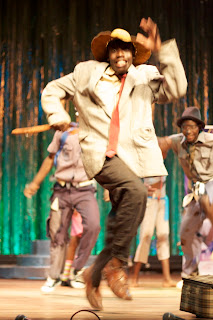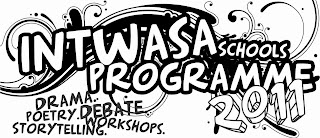INSTITUTIONS SHOULD PLAY A LEADING ROLE IN ARTS DEVELOPMENT
Municipalities, towns and universities world over have become famous due to different kinds of cultural festivals they sponsor and host. These festivals go on to attract artists and audiences from the breath and length of the globe. This is done as a means of promoting the city’s culture, cultural diversity and helps preserve the city’s cultural trends and develops the creative spirit among its cultural activists. Universities create platforms to expose the talent they are nurturing through sponsoring festivals and conferences that are aimed at enriching the arts and culture industry. Cities have an extra mile of building facilities for such cultural activities that are also availed to the development of the arts by local practitioners and performers.

The development of the arts in Zimbabwe will only effective when academics that do research on cultural and artistic trends of Africa from an African perspective begin to publish their research findings for the young generation to read, learn and develop as part of a cultural and artistic trend that has made them who they are. Most reference books used in colleges and universities are books written by non-Africans. This in most cases did not understand the cultural, ritualistic trends of African life and theatre which to them was barbaric and outdated. My point in this is that our own universities have shelves full of research projects that can be of use to young people doing their studies in the cultural and arts sector. The University of Zimbabwe’s Department of Theatre Arts has been churning out graduates who have done researches ranging from dance, rituals, theatre, theatre for development, stagecraft that can be of use and more applicable to undergraduates in the same department in other teething university departments. There are other researches that were done by Master of Philosophy students that in my own opinion are of great importance to the cultural and artistic industry.
My point in this is that if we look at leading universities in Africa and the world over are the leaders in publishing such works so that it is readily available to everyone who might need to use it. Most of the reference books used by students at colleges and universities are publications by other universities. Our own talented and intelligent people have left our universities to publish their works with other universities because our own universities have no capacity or can not publish their work but can only keep it in its departmental libraries as dissertations and thesis. Our departments of Theatre Arts at the University of Zimbabwe, Midlands State University, Great Zimbabwe University and the newly created one at Lupane State University should strive to create such platforms if ever, these institutions are serious with developing the arts in Zimbabwe.
Secondly, cultural and artistic conferences that have gone to make definite marks in the artistic and cultural industry have been hosted and funded by universities. These universities have even gone a step further in creating partnerships that have continued to create environments for research, workshops and practical work towards the development of the arts. The University of Zimbabwe used to have a theatre week that was very pivotal in exposing talent and creating an environment for discourse and dialogue. But what happened to it? The Great Zimbabwe University has its own festival that seeks to enable research, discussion as well as the practical application in the arts industry. But in all fairness, this is not enough. This is the major reason why most graduates from these Department of Theatre Arts divert to teaching because in their training and practical grounding they never had a chance to get exposure and break to the professional platform. There is need for our universities to do more, especially the Departments responsible for theatre arts and cultural development.

The arts and cultural sector is a participatory, practical and experiential industry where activists spend much time doing practical workshops and developing their creative works. These workshops form a crucial stage in the development of scripts for plays, dance dramas and television programs. Many professional theatre practitioners have become prominent because they documented their creative works and later published for public consumption. Talk of Wole Soyinka and Athol Fugard. If the creative process followed by Tumbuka Dance group is documented, it would create a long lasting legacy beyond Mathius Julius and Gilbert Douglas and provide alternative creative avenues for upcoming ballet groups and dancers. If the rehearsal process and scriptwriting workshops of the first year students are documented, the creative, mind blowing scripts would not be lost just after the students have earned their marks. This destroys continuity in the development of the young creative students during their stay at the university. Documentation is vital.
Successful and festivals that have grown from strength to strength are those that are mothered and nurtured by their mother cities and towns. Talk of the just ended Port Elizabeth Festival, the Edinburg Festival, Grahamstown Festival just to mention a few. These festivals have grown to become major calendar events in the cultural and artistic industry and put their mother cities on the limelight. Our own cities should take the major lead in the preparation, mobilization of resources and availing spaces as well exploring their twining arrangements with other cities for the development of the cultural and artistic sector. The Harare City Council should do even more than availing the Harare Gardens to HIFA. It should be the major driving seat in the mobilization of resources, negotiation with Zimra, getting clearances for artists among other things. It is Harare as a city that has the star shining bright on when HIFA surpasses expectations. It is Harare as a people that feast on the diverse and engaging productions that show at HIFA. It is Harare as a host city that everyone talks about when they talk about HIFA. I guess that’s why it is called Harare International Festival of Arts.

The same goes for the City of Bulawayo. Intwasa Arts Festival of Arts koBulawayo should be treated as their baby to nurse, grow and nurture. It is Bulawayo and its scenic surroundings that people will go on for years talking about because of the festival. It is the welcoming and friendliness of the people of Bulawayo that visitors will talk about in their way back home. It is therefore Bulawayo as a city that benefits much. It is our expectation as cultural activists based in Bulawayo that the city council should be seen in the driving seat in the promotion, support and growth of Intwasa. The city of Bulawayo is regarded as the cultural capital of Zimbabwe because of the work that the city council has done in developing the arts and cultural sector. Most influential artists such as Victor Kunonga, Albert Nyathi, Dudu Manhenga and Lovemore Majaivana are proud products of Bulawayo as a city. It is this legacy that Intwasa Arts Festival koBulawayo seeks to preserve and maintain, thus calls for the involvement of the city fathers.
In conclusion, institutions such as universities and town councils should play a leading role in the development of the arts. The towns/ city councils are the major areas with a high unemployment rate with the youths taking the major percentage of this unemployed group. Young people have proved to be artistic, thus, city councils will be creating more opportunities of employment through supporting the arts and cultural sector. Thus, a need to support the arts and cultural sector. Universities should put in place mechanisms that enable local publication of research works which can be made available to the artists locally. Let the Bulawayo City Council lead the pack this year as they support Intwasa Arts Festival KoBulawayo. This is a challenge to you our City Fathers.
Nkululeko Sibanda

















